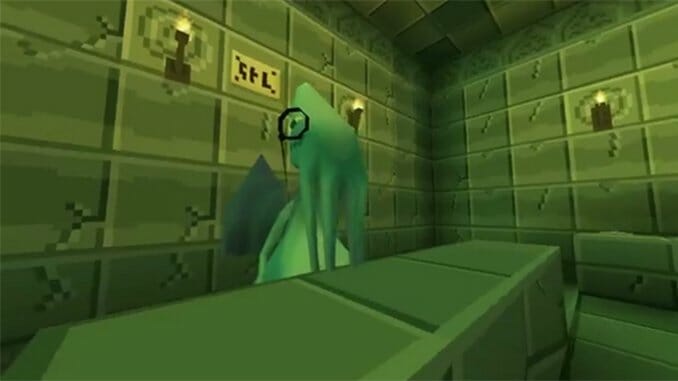Eldritch (PC)

H.P. Lovecraft-inspired horrors haven’t begun to feel as clichéd as zombies yet, but it’s getting close. That’s why I appreciate Eldritch taking an approach that most other Lovecraft imitators do not: it shuts up for like five seconds to let the world speak.
Eldritch is haunting and filled with dread, a first person stealth game in a randomly generated world where death is permanent. Yet Eldritch’s world is made up of blocky Minecraft-esque polygons that are not easy to make scary. Screenshots of the game almost make it look cute, but there is something certainly feels off about the worlds that are grey, misty and painted in dull sickly colors. Yes, Eldritch is scary—not just due to of the ever-present stress of permadeath, though that fear is unignorable—but because of the game’s sound design. There is haunting ambient background music played on an electric guitar that, even though it sounds nothing like Akira Yamaoka, reminds me of Silent Hill, the last time I felt this pleasantly unsettled by a horror game. The monsters growl in a cacophony that lets you know that they’re near but obscures exactly where they are. The sound of running water signals that a health power-up is close by, cuing your desperate hope that no creature will cruelly surprise you before you can reach it.
This is the second roguelike I’m reviewing in as many months (the first being The Guided Fate Paradox), and I could not be happier about that. Roguelikes are quite popular in the indie scene at the moment, to the point where I expect people to start saying, “gosh, this fad is getting old, I am rolling my eyes.” People will say “fad” because they are trying to be snooty and make you think that roguelikes are on the same level as pogs. Let me tell you: roguelikes are the opposite of pogs.
In a roguelike, you die when you die, and there is no saving or otherwise retaining progress. The levels are randomly generated anew each time. Those aren’t the only salient features of a roguelike, but they are the most important ones, and while this seems dangerous and scary—one wrong move means you lose everything—it’s actually quite freeing to look at your character like one of those sand mandalas made by Tibetan monks that will be destroyed the next morning. Rather than steadily build a character over the course of a 20+ hour adventure, you can experience the same thing in less than two, which means that you can to try a whole lot more ways to play the game than “one” for games like Dishonored that, no matter how good they are, I simply don’t have the energy to replay.
Eldritch in particular has fulfilled my wish for a roguelike version of Dishonored that I can play through in two hours whenever I feel like it and have it be totally different each time (a concept I once described on my blog as the most perfect game I could possibly envision). Eldritch is not perfect, and at the time of launch it still fairly bare-bones, but it is tense, spooky, and has infinitely different and fun ways to stab little cultists in the back.
Eldritch provides a shorter, simpler, faster game of sneaking around, stabbing and using magic powers, where you can try out a build in less than an hour. As stated, the builds are randomized, impromptu, and based on what you find lying on the ground. The game basically forces you to try builds you might not have picked yourself, which encourages you to discover new ways of playing. Combined with the randomized environments and variety of enemies, there are countless, organically arising situations through which to test your skills at the game and your choice of weapons and abilities.
